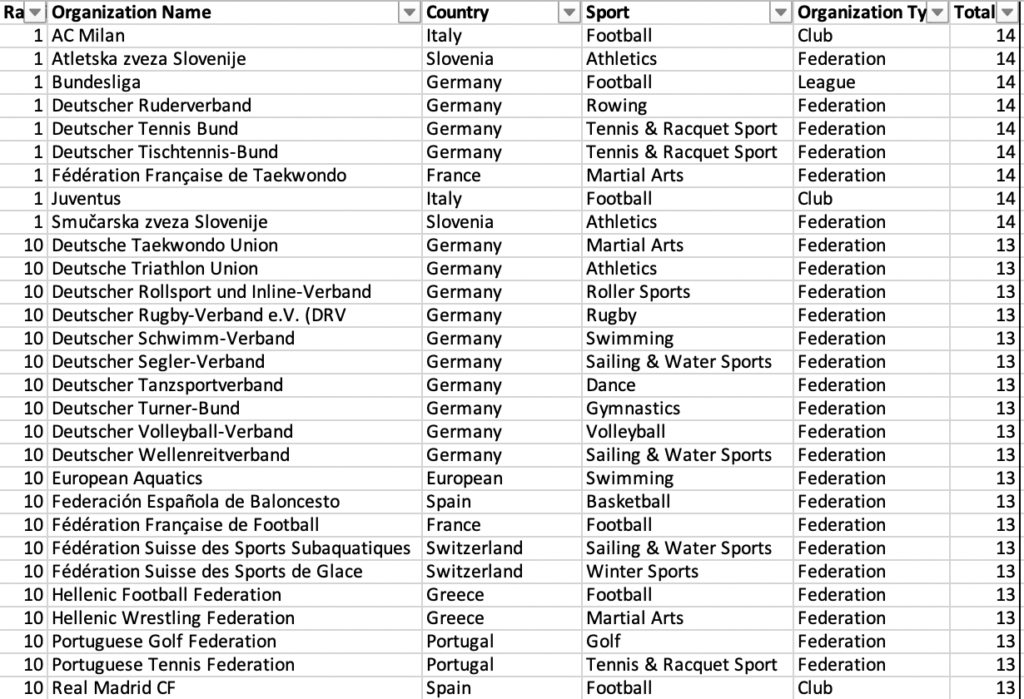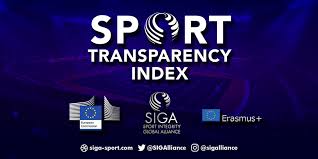June 18 – The Sport Integrity Global Alliance (SIGA) has launched its Sport Transparency Index, a benchmarking tool to assess transparency and good governance across the European Sport ecosystem.
The Index focuses on European Sport Stakeholders, from professional clubs to leagues, national federations and international governing bodies. In its first iteration the Index ranks almost 650 organisations, predominantly from Germany, Italy, France and Spain.
There are no English sports entities or clubs ranked, though the UK is outside the European Union and the project was financed by an EU Erasmus grant.
The project was co-funded by the European Union through the Erasmus+ programme.
It was developed by SIGA Europe, in conjunction with EPSI, Institute for Sport Governance, Universidad de Castilla-La Mancha, ICSS Europe, Brussels School of Governance, FEDA, European Multisport Club Association, International Olympic Trice Centre and the Portuguese Swimming Federation.
Football has six clubs, leagues and federations ranked in the top 30 with AC Milan, Germany’s Bundesliga and (incredibly) Juventus all ranked equal top with seven other non-football sports entities.
“The Sport Transparency Index is not just a ranking. It’s a mirror, held up to those who govern, those who lead, and those who benefit from the global spectacle of sport. It asks one simple, fundamental question: Are you living up to the ideals of sport and its values? Are you upholding the trust of athletes, fans, and the global business community?” said Emanuel Macedo de Medeiros, SIGA’s Global CEO.
The evaluation was conducted using a set of 15 Universal Transparency Indicators, which were developed via research and stakeholder consultation. All data used for the assessments was sourced exclusively from publicly available information on official websites. The issue here is whether that data passes the ‘truth’ test.
“This is not about pointing fingers or casting blame. This is not about naming and shaming. This is about shining a light on where we can do better and encouraging those in positions of power to rise to the occasion. This is about rewarding those who lead by example and challenging those who fall short to strive for something better,” said Macedo de Medeiros.
Though the obvious counter to that is perhaps it really is time to start naming and shaming if real sports integrity progress is to be made. At what point does sports become about sports and at what point is it purely a business? It is an issue that football’s governing bodies and the FIFA in particular, struggle with and manipulate to their own agendas. The criticism of this first index is that it only supports their agenda and could only ever do that the way it has been structured. And the danger with that is that people cme away believing that everything in the garden is rosy.
Even so, this is an important first step and a potentially useful tool across the whole football spectrum.
The ‘Transparency Indicators’ were organised under three main themes:
Organization Domain: Governance and organizational structure, Code of Conduct, Board Membership, Membership (in organizations), Lists all sponsors/Partners, General Assembly.
Operational Domain: Equal opportunities and Diversity Policy, Data Privacy and Security Policy, Whistleblower Policy, Stakeholder engagement/Consultation Policy, Sport Betting Policy.
Financial Domain: Compliance with Accounting Standards, Financial Disclosure and Reporting, Procurement Policy, Anti-Corruption Policy.
The Index was compiled with a total budget of approximately €400,000 over a 30-month period. SIGA said it will be updated annually.
Sport Transparency Index ranking:
Contact the writer of this story at moc.l1754392754labto1754392754ofdlr1754392754owedi1754392754sni@n1754392754osloh1754392754cin.l1754392754uap1754392754
